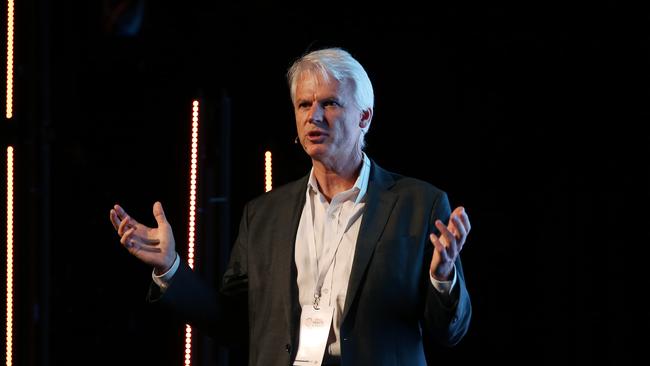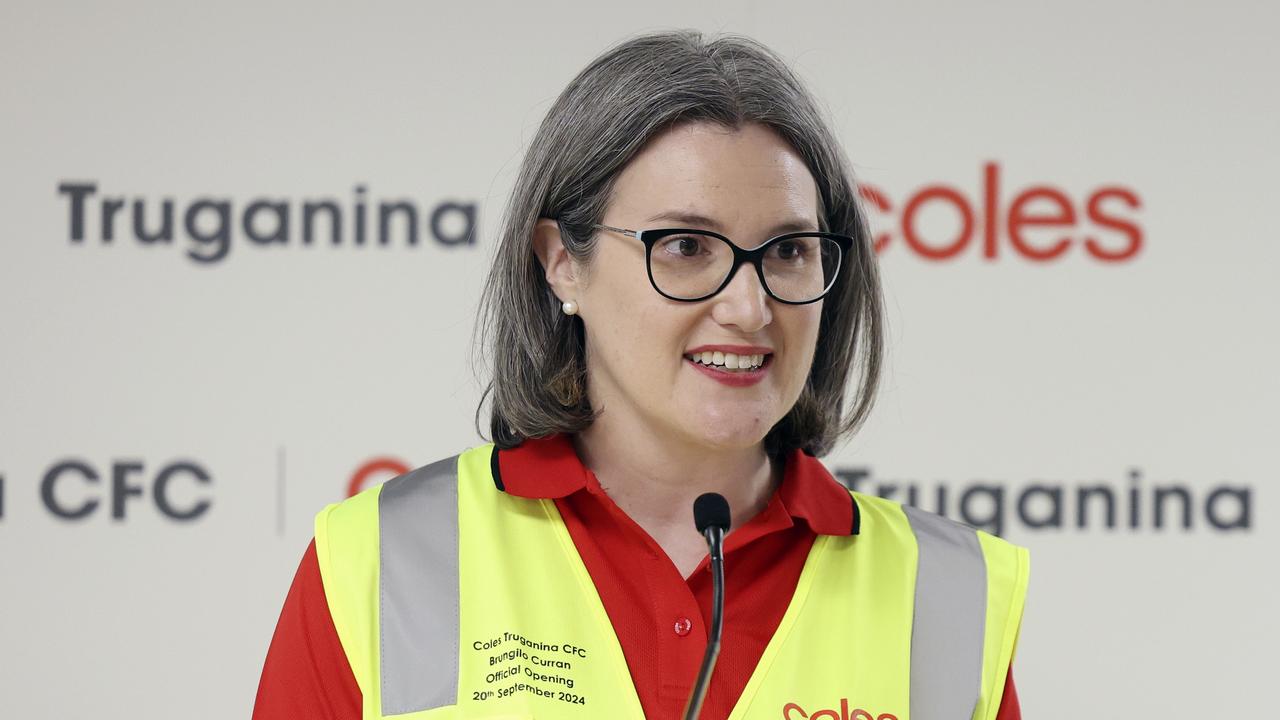Cooper Investors has tough questions to answer over staff changes amid industry ructions
Turbulence is rocking Australia’s funds management sector, with Cooper Investors the latest firm to see heightened turnover of employees and board members.

Business
Don't miss out on the headlines from Business. Followed categories will be added to My News.
The turbulence rocking the local funds management sector isn’t letting up in 2024, with Peter Cooper’s well-known firm Cooper Investors the latest to succumb.
This column understands Cooper Investors and its managing director Rhys Cahill have parted ways in recent months, after he served just 18 months in the role. Another senior departure is also expected in coming weeks, which will follow Cooper Investors’ research analyst Sacha Krien decamping to re-join E&P Financial.
Cahill’s predecessor and former JPMorgan asset management banker Ron Dewhurst also had a relatively short stint as Cooper Investors’ executive chair and chief executive.
Another short tenure was ASX-listed Envirosuite chairman David Johnstone, who helmed Cooper Investors’ board for almost 18 months up until mid-last year before leaving the post, according to LinkedIn.
The high turnover of staff at the firm raises questions about whether there are underlying issues at Cooper Investors or is something else going on? Investors with the firm should be seeking clear answers around the turnover issues and clarity about the firm’s ongoing leadership, particularly given how important key man risk is in funds management.
Peter Cooper, who is well regarded in fund management circles and whose wealth was this year estimated at $631m by The Australian’s The List, founded Cooper Investors in 2001 and the firm manages about $11bn across funds and investment trusts. He is listed on the firm’s website as chief investment officer.
Asked about the departures and whether the firm would appoint a new managing director or CEO, Cooper sidestepped the question but said: “In the Darwinian sport of long-term investment where few succeed, CI is committed to its long-term strategy of aligning human capital with financial capital.
“We are driving the business towards excellence in everything we do, we call it the CI Way.”
Fielding questions from this column, Cooper confirmed that former US CEO of the TLEX Institute Johann Berlin has been an adviser to Cooper Investors for almost a decade and he said Berlin was currently the firm’s interim chief operating officer.
Berlin’s LinkedIn profile also notes he has spent almost two decades as a faculty member and volunteer for the Art of Living Foundation, which is “committed to spreading wellbeing and happiness in communities around the world”. Additionally, he is an ambassador for The Parliament of the World’s Religions.
TLEX is a global organisation that works with large companies, business schools and government institutions and draws on the teachings of Gurudev Sri Sri Ravi Shankar.
Cooper has also publicly outed himself as a pupil of The Art of Living founded by Gurudev in 1981 as an international educational and humanitarian organisation to revive, preserve and grow ancient Vedic knowledge traditions based on the oldest scriptures of Hinduism.

While Berlin appears to have a consulting and organisational development background, his LinkedIn profile doesn’t show any notable experience in the investments industry. The Art of Living has in some circles been accused of being cult, often by those that have left the meditation empire. In one instance, a follower alleged he was told to leave behind his unconscious family, or parents, because his spiritual family was more important. The Art of Living is also fending off allegations of land encroachment in India.
Pertinent questions need to be raised by Cooper Investors’ stakeholders about Berlin’s longstanding role within the business. Berlin’s LinkedIn profile notes he has served as Cooper Investors’ consulting chief ethos and learning officer and adviser to the founder, CEO and board.
Separately, ratings house Zenith last week downgraded two Cooper Investors’ global share funds, citing the second restructure of the firm’s portfolio management personnel over the past three years.
The changes saw Zenith downgrade the funds to an “approved” rating, after a period of review. Prior to the review the two funds were rated “recommended”.
The downgrades relate to the Cooper Investors Global Equities Fund (Hedged) and the Cooper Investors Global Equities Fund (Unhedged), after Marcus Guzzardi and Geoff Di Felice were appointed the co-portfolio managers of those funds, replacing Christopher Dixon.
Zenith highlighted the change represented the second portfolio management restructure over the past three years.
Regarding those changes, Cooper said: “Geoff Di Felice and Marcus Guzzardi have been the architects of our Endeavour Fund, which is outperforming its benchmark and is CI’s best alpha generating fund since it was founded in 2021. I have every confidence in their leadership and expertise.”
He also said Dixon would run a new strategy within the firm’s global shares platform.
“We have secured the backing of a key institutional partner to establish the Cooper Investors Global Stalwarts Strategy … Chris, Marcus and Geoff continue to report to me, the founder and CIO, maintaining the collaborative chemistry,” Cooper said.
Cooper’s firm is also in the process of setting up a retail unit trust for the stalwarts strategy, which it defines as strong companies delivering compounding advantaged returns derived from “steady, low-volatility business models that are resilient in downturns”.
The performance of the Cooper Investors global funds – relative to benchmarks they are measured against – has, however, proven mixed over different time frames.
The hedged Global Equities Fund for retail investors has underperformed the MSCI AC World Index Net Dividends benchmark by 0.69 per cent over 10 years, and trailed by 6.7 per cent over three years. Over the three months ended September 30, it beat the benchmark by 1.74 per cent. The wholesale hedged Global Equities Fund outperformed the same benchmark by 0.83 per cent over 10 years, but underperformed by 5.5 per cent over three years. Over three months, the fund is 2.1 per cent ahead.
Cooper Investors’ flagship Australian equities fund has outperformed the S&P/ASX 200 Accumulation Index over 10 years by 1.53 per cent, but more recent performance has proven underwhelming.
Over three years, the Australian equities fund has trailed the benchmark by 0.65 per cent and for the three months ended September 30 it is lagging by 1.89 per cent.
Cooper Investors isn’t, however, the only firm navigating a challenging period in the local funds management sector.
The domestic funds management industry has endured a difficult three years – including a shake-out of players – spanning listed and private firms.
Rationalisation is being underpinned by factors including fee compression, mergers between industry funds (which translates to fewer mandates), succession planning issues, the rise of lower-fee passive investing, a shrinking financial planning industry and more industry funds managing a larger proportion of their share portfolios in-house.
Regal Partners, which has acquired firms including VGI and PM Capital, has this month begun due diligence as part of attempts to buy Kerr Neilson-founded Platinum Asset Management.
In 2024, there have been a spate of examples, including Antipodes Partners agreeing to acquire well-known firm Maple-Brown Abbott and boutique Ethical Partners Funds Management opting to wind-up its fund and return investors’ money. At its peak, Ethical Partners managed more than $3bn. Under-pressure Perpetual, which completed a takeover of Pendal early last year, is divesting much of its wealth management and corporate trust business in a deal with private equity giant KKR.
And Magellan Financial Group is yet to recover from a tumultuous period that saw the departure of founder, chairman and investment chief Hamish Douglass, and more recently the exit of chief executive David George. The firm is now run by executive chair Andrew Formica and managing director Sophia Rahmani.
What’s clear is fund managers across Australia – whether they are managing domestic or global stocks – are having to work harder to retain their funds under management and keep performing better than benchmarks to justify their existence. Good governance is part of the equation too and ensuring key man risk can be adequately managed.
There is a long list of considerations for fund managers, but as the stewards of billions of dollars in retirement savings, so there should be.
Originally published as Cooper Investors has tough questions to answer over staff changes amid industry ructions



